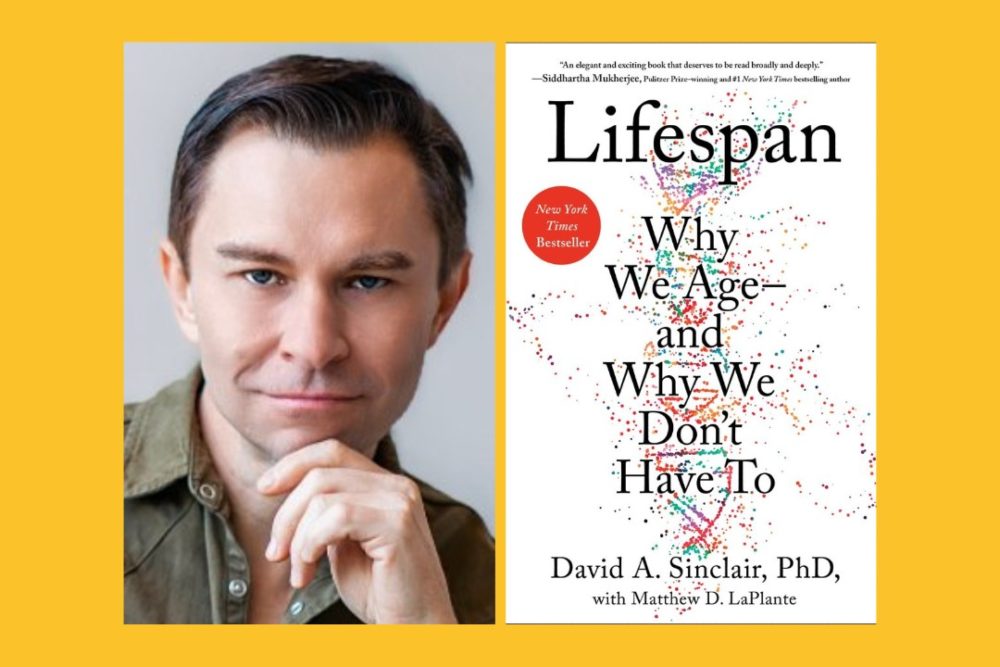David Sinclair Lifespan Review 2023

Executive Summary of Lifespan: Prof David Sinclair
1. Low levels of leucine, isoleucine, and violin BCAAs correlate with increased lifespan2. Exercise turns on the genes that make us young again
3. Hunger and calorie restriction plays a big role in vitality and longevity
4. Get exposed to cold
5. Shift to vegetarian/vegan diet
6. Sauna 7x a week may be great
7. NMN molecule boosts NAD 8. He takes it in supplements + Metformin
9. Nicotinamide Riboside (NR) is converged to NMN, it’s cheaper, but it doesn’t raise NAD levels as MNM does
10. Rapamycin is powerful, but toxic
What David Sinclair does
~1g (1000 milligrams) of NMN+ 1g of resveratrol shaken into his homemade yogurt every morning~Daily dose of vitamin D,
~vitamin K2
~83mg of aspirin (baby aspirin)
~Keeps sugar, bread and pasta intake as low as possible,
~no deserts - skips one meal a day (largely skips lunch)
~Tests blood for dozens of biomarkers every few months and moderates them with food and exercise if not optimal levels ~Takes a lot of steps and runs up stairs daily
~Exercises, sauna, cold plunge pool
~Mostly plant-based diet
~Avoids microwave plastic, excessive UV exposure, X-rays and CT scans
~No smoking
~Stays in the cool side during the day and when he sleeps at night
David Sinclair Lifespan Review by Charles Brenner
In a letter to the editor published in Archives of Gerontology and Geriatrics, Charles Brenner, a chairman at the City of Hope National Medical Center who helped popularize nicotinamide riboside as a NAD+ precursor, reviews David Sinclair’s book Lifespan.Our Lifespan has a Limit
Dr. Brenner starts by explaining his own outlook on aging. Citing three publications (one his own), he states that our natural lifespans are limited by our genes, and we can only live for about 120 years maximum. He goes on to say that we only live long enough to reproduce and make sure our offspring reproduce. In the end, he says, we don’t have the genes to allow us to live far beyond our reproductive and caretaking years.
Is Aging a Disease, and is it Treatable?
Pointing out two questions on the back cover of Lifespan, Brenner answers them. The first is “is aging a disease?” Brenner’s answer is that aging is a risk factor for many diseases, but aging is not a disease itself. He follows by saying that the most powerful genetic mutations to extend lifespan in animal models have been in genes that control growth, establishing that growth and development are intricately linked with aging, suggesting that aging is inevitable.
“Is aging treatable?” Yes, says Brenner, in the sense that genes can be modified to change the rate of aging. He says, however, that it is easier to accelerate aging — by doing things like smoking or becoming overweight — than it is to slow aging. He then comments on well-known studies showing that caloric restriction (consuming fewer calories) extends the lifespan of mice. These studies suggest that fasting can treat aging, but Brenner disagrees with their framing, saying,
“Caloric restriction extends animal lifespan when compared to caged animals with constant access to food. However, it is more accurate to say that unrestricted access to food is a life-shortening condition that is unlike conditions in the wild to which animals are adapted.”Brenner then makes the point that lifestyle changes can improve health, but getting healthier is not the same as reversing aging.
Do Sirtuins Extend Lifespan?
Sirtuins are enzymes that play a key role in cell survival processes like DNA repair. Brenner says that, in Lifespan, sirtuins are claimed to extend lifespan. He then cites contrary evidence, with studies showing that sirtuins do not extend the lifespan of yeast and flies, and Brenner’s own study showing that sirtuins shorten the lifespan of yeast.
Furthermore, Brenner states that Sinclair claims resveratrol is a sirtuin activator. He then cites his own paper showing that resveratrol falsely amplifies sirtuin levels because of the way sirtuin activity is measured. He goes on to explain how the positive results for sirtuins and resveratrol have been amplified by the media, whereas the negative results have seen far less exposure.
“The global interest in sirtuins and sirtuin activators was such that companies—most notably GSK—spent many billions of dollars trying to get a positive result and could not because the so-called sirtuin activators do not activate sirtuins and because sirtuins are not longevity genes,” states Brenner.What Breakthroughs?
Brenner ends by saying that “the reach of Lifespan is a problem for the world precisely because a Harvard scientist is telling fictitious stories about aging that go nowhere other than continuing hype as legendary as anything in Herodotus,” referring to lore concerning the fountain of youth by the ancient Greek historian.
Conflict of Interest
It should be noted that Dr. Charles Brenner is the Chief Scientific Advisor for ChromaDex, the company that produces TruNiagen, which contains the NAD+ precursor nicotinamide riboside. Similarly, Dr. David Sinclair is the co-founder and member of the scientific advisory board for Metro International Biotech, which produces an NMN NAD+ precursor called MIB-626. By promoting NMN in his book Lifespan and elsewhere, Sinclair may have harmed the commercial interest of TruNiagen. Therefore, there exist a conflict of interest between Brenner and Sinclair.





.png)


Comments
Post a Comment